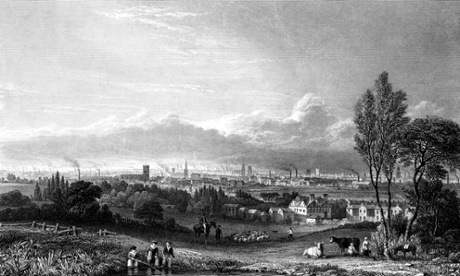Submitted by WA Contents
What makes a city a city - and does it really matter anyway?
United Kingdom Architecture News - May 09, 2014 - 08:07 2268 views
In the dizzying world of tech cities, garden cities and smart cities, perhaps it's time to redefine what it means to be a city at all

A view of Manchester in 1844 by Thomas Higham. The lack of a diocesan cathedral meant Manchester did not win city status until 1854. Photograph: Alamy
Whatever the perceived strengths and weaknesses of your city's brand, one thing appears unarguable, and that's the value of being identified as a city in the first place.
In the US midwest, admittedly, the word "city" has been appended with abandon to any one-brothel main street that once offered relief to travellers across the prairies. Likewise Australia, where Melbourne suburbs style themselves as cities and outback dots such as the City of Dubbo appear on the map. This is the pioneer spirit at work – echoing ancestors' hopes and ambitions for these remote settlements.
Nowadays, however, towns everywhere seem to have aspirations to brand themselves with city status – and sometimes even that isn't enough, when there is also a "global city" or "city of culture" title to be garnered. Beyond the brand blather, does the city distinction really matter? I think so – but that we need a more discerning definition of the title (and, for that matter, subtitles such as "eco-city", "smart city" and the like).
And so to fledgling Ebbsfleet Garden City, a clip-on surburb planned in the eastern periphery of London that was recently (re)announced by the UK's chancellor, George Osborne.
In name at least, Ebbsfleet echoes the ambition of the garden cities movement that first gained traction at the beginning of the last century, and led to the establishment of Letchworth Garden City and Welwyn Garden City as a reaction to England's overcrowded, high density, polluted capital. In a garden city, healthy, peaceful residents were envisioned as having the physical space to grow their greens and the mental space to better themselves of an evening at educational institutes, rather than drink their way through their wage packet at the local....Continue Reading
> via The Guardian